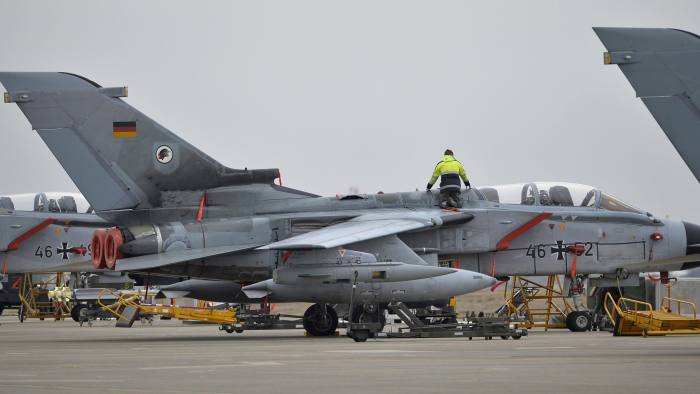Trade disputes reveal the EU’s strategic weakness
A bloc of nations with small-country mindsets wallowing in a permanent state of dependence
Wolfgang Münchau

German Tornado jets at a base in Incirlik, Turkey, in 2016. The warplanes are no longer considered fit for Nato missions © Reuters
The EU is the world’s largest economy. It is home to many of the world’s most successful companies. It has its fair share of political tension and economic crises, but its democracies are robust and its societies stable. And it has an overwhelming interest in maintaining a rules-based system of global governance. Why then is its influence in the world so small?
The reason is not so much the proverbial lack of a single telephone number. The deeper problem is a permanent state of dependence: on Russia for energy supplies; on the US for defence; and on the rest of the world to absorb the EU’s current account surpluses.
The majority of EU countries that are also Nato member states promised in 2006 to increase their defence budget to 2 per cent of GDP. Only four can claim to have met or nearly met the target — the UK, Poland, Greece and Estonia. France is not far off, but Germany’s defence expenditure was only 1.24 per cent last year. German media are full of reports about the decrepit state of the Bundeswehr. German Tornado warplanes are no longer considered fit for Nato missions. The country has scope to increase defence spending if it wanted to. But the combination of a self-imposed rule to run permanent fiscal surpluses and the non-defence spending priorities of the recently constituted grand coalition prevent this.
Despite sanctions against Russia, the EU’s dependence on Russian energy is also now greater than ever. In 2017, Gazprom, the Russian gas company, registered a bumper year of gas deliveries to the EU with record sales to Germany and Austria.
The macroeconomic dependency is more subtle, but it shows up in trade policy. The eurozone had a current account surplus of 3.5 per cent of GDP in 2017 — almost €400bn — a sum that needs to be absorbed by offsetting deficits in the rest of the world. The trade surplus explains why the EU is not keen to impose counter-sanctions to the US steel and aluminium tariffs once the temporary exemption ends on May 1.
The root cause of the EU’s overdependence on other powers is, as it has always been, a collective action problem: a collection of small countries, each of which has their own small-country mindset. There is no such thing as an overall economic, let alone geopolitical, strategy.
The current account surplus, for example, is not a deliberately chosen objective but an effect of national accounting — a number at the bottom of a long spreadsheet. EU households and companies are running external savings surpluses. The collective decision by most eurozone member states to shift the government sector into a permanent surplus then implies a structural current account surplus for the entire eurozone economy.
I recall a conversation a decade ago with the late Italian economist Tommaso Padoa-Schioppa, who saw the euro as a potential instrument of geopolitical power, similar to the role the dollar has played for the US. The idea was to acquire what US economists like to refer to as “the exorbitant privilege” — a status bequeathed by the role of the dollar as a global reserve currency. The exorbitant privilege allows the US to print dollars to finance its own imports. In such a lucky position, you cannot conceivably face a balance of payments crisis.
The eurozone could at least have tried to share its spoils with the US. Such a strategy could indeed have raised its global power and influence. But instead, the EU preferred to subject itself to small-country fiscal rules, giving rise to the triple whammy of a structural current account surplus, an underfunded defence system, and an over-dependence on energy imports.
When you need the world more than it needs you, you are weak. The eurozone is in that position. The US is strong because it has made itself indispensable to the global economy. Of course, President Donald Trump’s trade sanctions will be bad for the US economy. But the point is that he can get away with it.
Russia is more self-sufficient than the EU. China is moving in that direction. What bothers me about the eurozone is not its failure to attain a geopolitical role, but that it never wanted it in the first place.
0 comments:
Publicar un comentario